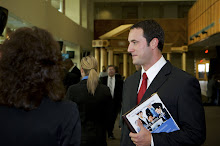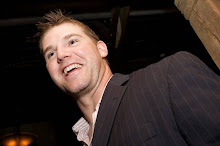U.S. Olympic Training Features
A New Requirement: Etiquette 101
Course on Booze, Hugs and Chopsticks
August 6, 2008; Page A1
PALO ALTO, Calif. -- As the Beijing Games start this week, the leadership of the American team is hoping its athletes will embody the Olympic motto: faster, higher, stronger.
It also hopes they'll behave.
"I don't doubt you will do your best as ambassadors," former President George H.W. Bush said recently in a video shown to about 50 U.S. Olympic swimmers and coaches here. "You are role models -- and your actions matter."
Jen Pan, a Chinese-language teacher dressed in black pants with floral designs at the cuffs, then ran the group through a crash course on Chinese culture. She included some vocabulary ("Everybody say ren-min-bi!"), social customs ("Chinese do not hug"), eating etiquette ("Do not spear the food with your chopsticks"), and drinking habits ("Chinese don't really drink, except at banquets.")
The U.S. Olympic Committee, for the first time ever, is requiring all of its 596 Olympians to attend this course prior to traveling to Beijing. The committee has dubbed it the "ambassador program."
Some athletes have another name for it: the Bode Miller show.
"The USOC isn't calling it that, but everyone knows what this is about," says Eli Bremer, who will be competing for the U.S. in the modern pentathlon.
What this is about, according to Mr. Bremer and other athletes, is avoiding a repetition of what happened during the 2006 Winter Games in Torino, Italy. Mr. Miller, the American skier who was expected to win a medal in as many as five events, portrayed himself throughout those Games as more interested in partying than winning. He was photographed drinking in bars the evening before races, in one instance prominently displaying his middle finger.
Mr. Miller was unrepentant. "I got to party and socialize at an Olympic level," he said in much-reported remarks that embarrassed the USOC and angered sponsors. He finished no higher than fifth in his events.
Mr. Miller couldn't be reached for comment. Messages to his agent and his family in New Hampshire were not returned. This past winter, however, Mr. Miller won the overall World Cup title for the second time, after breaking from the U.S. ski team and renouncing alcohol for the season.
A Two-Day Course
Keen to avoid such scenes on the much bigger stage of the Beijing Olympics -- expected to be the most-watched Games in history -- the USOC last autumn launched the new program. U.S. Olympic officials are hoping for exemplary behavior, especially in light of the diminished U.S. image abroad, due in part to the unpopular war in Iraq.
The course includes role-playing and group games and typically lasts two days. In the past, the USOC devoted no more than about 15 minutes to behavioral guidance.
"It is a response to lessons learned that we need to do a much better job of providing a basis for decision-making," says Darryl Seibel, one of the course organizers and head spokesman of the USOC. "This is to make clear what America expects of its Olympic team."
Mr. Seibel declined to say if the effort resulted from Mr. Miller's actions in Torino. There have been other episodes in recent years.
Last July, at the Pan American Games in Rio de Janeiro, a Brazilian journalist photographed a message board at the American media center that said: "Welcome to the Congo." The incident triggered an outpouring of anti-American fervor among Brazilians who felt their country had been called primitive. The USOC apologized -- explaining that the message referred to tropical heat -- and sent home a USOC official shown in the photograph.
The 2000 Summer Games in Sydney featured several embarrassing moments, including U.S. swimmer Amy Van Dyken spitting in the lane of Dutch swimmer Inge de Bruijn before one of their races. Members of the U.S. men's track team apologized after excessive celebrating following their win in a relay race, including flexing their muscles and sticking out their tongues. U.S. hockey players in Nagano, Japan, trashed their hotel rooms during the 1998 Games.
Explaining the Rings
The course, held in five cities across the U.S. in recent months, covered educational topics such as what the five interlocking Olympic rings represent -- unity among the five continents from which athletes hail. Also discussed was how to hold the American flag during a victory lap. (Answer: not upside down.)
"When someone throws you an American flag, we want to make sure you know what to do with it," says Andrew Valmon, who won a gold medal in the 4x400 relay for the U.S. track team in both the 1988 and 1992 Games. He was one of several former Olympians helping with the program.
![[Bode Miller]](http://s.wsj.net/public/resources/images/HC-GM479_Miller_20080805180457.gif)
The course also taught athletes to go along with rituals that might seem silly. In one game, called "energy ball," athletes formed circles of a dozen or more and passed around an imaginary ball. The participants had to say "whoosh" when handing it to the right or left, while an imaginary throw across the circle required a "zap."
If someone wanted to hold the ball for a moment, he had to say, "groove-alicious," the cue for the circle to break into a little jig.
Why?
"We want to help them with things that make them uncomfortable," explains Cathy Salit, whose New York performance-training company, called Performance of a Lifetime Inc., was hired by the USOC for the program. "If they are going to be ambassadors, they have to be attuned to what's going on around them and be able to respond."
Ms. Salit, who also performs with an improv troupe in New York, says this was her first time working with Olympians. Her clients typically come from the corporate world.
"Compared with the folks at Citigroup, they were very good at getting into the groove of it," she says.
Back at the Palo Alto hotel, Ms. Pan, the language teacher, continued with her advice on Chinese practices: "If Chinese say they are not quite sure, they are probably saying 'no' to you."
Boys Being Boys
At times, the room took on the look of a college lecture hall. In the third row, swimmer Michael Phelps, the superstar who is vying for a record eight gold medals in Beijing, ate steadily from a bag of candy, his long limbs stretched over three chairs. Nearby sat Ryan Lochte, another top U.S. swimmer, thumbing text messages into his cellphone.
Ms. Pan passed out chopsticks to the entire group for a lesson on how to use them. Mr. Phelps took his and began jabbing a coach sitting nearby.
To review the handful of Chinese phrases Ms. Pan had taught the group, she asked, "If you step on someone's toe in China, what do you say?"
"Xie xie!" shouted one of the swimmers, using the Chinese term for "thank you."
Write to Christopher Rhoads at christopher.rhoads@wsj.com
![[Amy Van Dyken]](http://s.wsj.net/public/resources/images/OB-BZ306_bode_A_20080805120802.jpg)




No comments:
Post a Comment